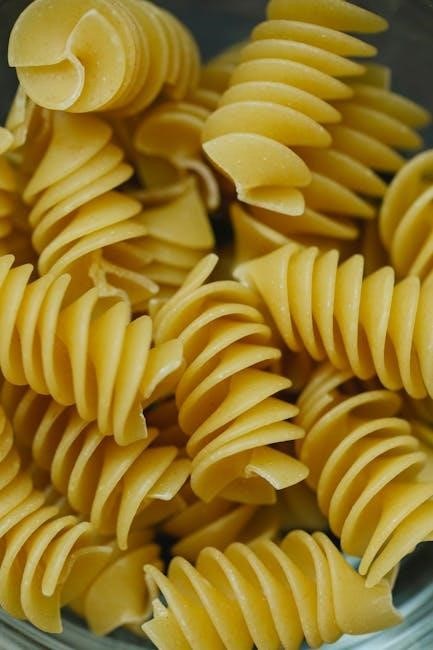Cook Once Eat All Week is a practical approach to meal prepping, helping you manage time and reduce cooking stress. It involves preparing a week’s worth of meals in one session, ensuring flavorful and nutritious dishes. Perfect for busy individuals, this method promotes efficiency and reduces food waste, offering flexibility and variety in your weekly menu planning.
Benefits of Meal Prepping
Meal prepping saves time, reduces stress, and enhances nutrition by preparing balanced meals in advance. It promotes healthy eating, reduces food waste, and helps with portion control, supporting weight management and long-term wellness goals effectively.
2.1 Time-Saving Tips
Meal prepping is a game-changer for saving time during the week. Start by planning your meals in advance and creating a grocery list to avoid last-minute decisions. Chop vegetables, marinate proteins, and cook grains in bulk to streamline meal assembly. Use batch cooking to prepare large quantities of staples like soups or casseroles, which can be portioned out for quick meals. Store prepped ingredients in airtight containers for easy access. Additionally, consider one-pot recipes or slow cooker meals that require minimal preparation and cleanup. By dedicating a few hours on the weekend to prep, you’ll save hours during the week and reduce the stress of daily meal planning. This approach ensures you have healthy, ready-to-eat meals all week long without sacrificing flavor or variety.
2.2 Financial Advantages

Meal prepping offers significant financial benefits by reducing food waste and optimizing grocery spending. Planning meals in advance ensures you buy only what you need, avoiding impulse purchases. Cooking in bulk often lowers costs, as purchasing ingredients in larger quantities can be more economical; Preparing meals at home reduces reliance on takeout or restaurant dining, which can be costly. Additionally, using leftover ingredients creatively stretches your budget further. Over time, these small savings add up, making meal prepping a cost-effective strategy for managing your household budget. By adopting this approach, you not only save money but also invest in healthier, homemade meals that benefit your overall well-being.
How to Plan Your Meals
Effective meal planning involves setting a weekly strategy, creating a grocery list, and organizing recipes. Start by assessing your schedule and dietary needs, then choose balanced meals for each day. This approach ensures variety and efficiency, making cooking enjoyable and stress-free while saving time and resources.

3.1 Weekly Strategy
A weekly strategy for meal planning begins with assessing your schedule and dietary goals. Choose meals that fit your lifestyle, ensuring variety and nutrition. Create a list of recipes, assign them to specific days, and make a corresponding grocery list. This approach helps in avoiding last-minute decisions and reduces food waste. Consider batch cooking proteins, grains, and vegetables on weekends or days off to streamline weeknight meals. Additionally, plan for leftovers to minimize cooking time during the week. Organizing your meals this way ensures you stay on track, save time, and enjoy balanced, delicious meals throughout the week.
3.2 Grocery Shopping Tips
Effective grocery shopping is key to successful meal prepping. Start by planning your shopping list based on your weekly meal plan to avoid impulse buys. Buy ingredients in bulk for non-perishable items like grains, proteins, and spices, as they save money and reduce trips. Shop for seasonal produce to ensure freshness and affordability. Organize your list by store sections (e.g., produce, meats, dairy) to streamline shopping. Stick to your list to avoid unnecessary purchases. Incorporate versatile ingredients that can be used in multiple meals. Don’t forget to stock up on storage containers and reusable bags for meal prep organization. Shopping once or twice a week reduces frequency and saves time. Finally, budget-friendly options like frozen vegetables and canned goods can stretch your grocery budget while maintaining nutrition.

Common Challenges
Meal prepping often faces challenges like time management, food boredom, and storage issues. Ensuring variety, maintaining freshness, and adapting to family preferences can also be difficult. Proper planning is essential to overcome these obstacles.
4.1 Common Mistakes to Avoid

When adopting the “Cook Once Eat All Week” approach, several common mistakes can hinder success. One major error is overpreparing meals without considering personal preferences, leading to food boredom. Another is lack of proper meal planning, resulting in last-minute takeouts. Many individuals also fail to account for portion sizes, causing either waste or insufficient meals. Additionally, poor storage techniques can compromise food freshness and safety. Neglecting to include variety in recipes is another pitfall, as it can make the diet monotonous. Lastly, some people overlook the importance of flexibility, sticking rigidly to a plan even when circumstances change. Avoiding these mistakes requires careful planning, realistic expectations, and adaptability to ensure a smooth and sustainable meal-prepping experience.

Solutions and Expert Tips
Expert tips emphasize meal variety, smart storage, and staying inspired. Plan meals strategically, use batch cooking, and incorporate leftovers creatively. Staying organized, flexible, and open to new recipes ensures long-term success and enjoyment of the “Cook Once Eat All Week” approach.
5.1 Overcoming Challenges
Meal prepping, like any routine, comes with challenges. One common issue is running out of inspiration, leading to meal monotony. To combat this, explore new recipes and ingredients regularly. Another hurdle is time management—dedicate a specific day for cooking to maintain consistency. Additionally, some people struggle with food waste, which can be addressed by planning meals around seasonal produce and using leftovers creatively. Staying organized is key; use calendars or apps to track your meal plan and grocery list. Lastly, don’t be too hard on yourself if things don’t go perfectly—flexibility is essential. By embracing these strategies, you can overcome common obstacles and enjoy the benefits of “Cook Once Eat All Week” without frustration. Remember, the goal is to simplify your life while nourishing your body and soul.
5.2 Staying Inspired

Staying inspired while following the “Cook Once Eat All Week” approach is crucial for long-term success. One effective way to maintain enthusiasm is by experimenting with new recipes and flavors. Exploring cuisines from different cultures can add variety to your meals and keep your palate engaged. Additionally, incorporating seasonal ingredients ensures your dishes remain fresh and exciting. Don’t be afraid to get creative with spices, herbs, and marinades to transform basic meals into flavorful experiences. Another key tip is to follow meal prep enthusiasts or food bloggers for inspiration—seeing how others prepare and present their meals can spark new ideas. Lastly, schedule a “meal planning day” each week to brainstorm recipes and organize your grocery list. By keeping your approach dynamic and open to change, you’ll find meal prepping to be a sustainable and enjoyable journey.
